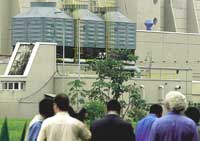More nuclear freedom for Brazil
 Brazil has won a major battle towards securing its right to produce nuclear energy for peaceful purposes. After months of struggle, it has reached a pact with the International Atomic Energy Agency (iaea), the un's nuclear watchdog, which would allow it enrich its own uranium at its Resende plant. Brazil has the world's sixth largest uranium reserves but at present it has to send its uranium to other countries for enriching before it can be used at its two nuclear energy plants. Brazil says it does not want to make nuclear weapons, which are banned by its constitution.
Brazil has won a major battle towards securing its right to produce nuclear energy for peaceful purposes. After months of struggle, it has reached a pact with the International Atomic Energy Agency (iaea), the un's nuclear watchdog, which would allow it enrich its own uranium at its Resende plant. Brazil has the world's sixth largest uranium reserves but at present it has to send its uranium to other countries for enriching before it can be used at its two nuclear energy plants. Brazil says it does not want to make nuclear weapons, which are banned by its constitution.
On November 25, 2004, Brazil's science and technology minister Eduardo Campos announced that the Resende plant would start processing uranium before the end of 2004. For months, Brazil and iaea had been unable to come to a consensus about the system to be used for iaea's inspection of the plant. Brazil did not want to reveal the plant's centrifuges and its technological know-how completely. But the us was pressuring it to give the iaea full access to its plant because it did not want Brazil's example to instigate countries like Iran to refuse international inspections of their nuclear installations. However, Brazil and the iaea have now reached an agreement, according to iaea general director Mohamed El Baradel. Campos said iaea technicians recently visited the plant to verify its design. "The visit was considered fully successful by both sides.
